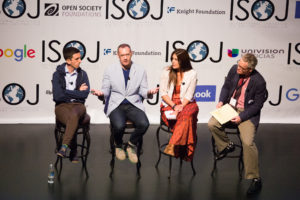April 22, 2017 | Fact Checking, International
Fact checking is changing the way readers think, but continues to face great challenges
Watch the fact checking panel discussion from ISOJ 2017.
With the global phenomenon of the proliferation of false news, and social networks as the main news sources of readers, the trend of verifying public discourse is spreading at a global level.

This international trend of fact-checking public discourse was the main theme of the second panel of the inaugural day of the 18th International Symposium on Online Journalism (ISOJ), held on April 21 and 22, 2017 at the Blanton Museum of Art, on the campus of the University of Texas at Austin.
Gardner Selby, editor of PolitiFact Texas / Austin-American Statesman, chaired the panel. The speakers were Alexios Mantzarlis, director of the International Fact Checking Network at Poynter; Craig Silverman, media editor for Buzzfeed News; and Laura Zommer, executive and editorial director of Chequeado, Argentina.
In his presentation, the director of Poynter argued that fact checking is managing to change the way readers think. However, he added, it is still perceived as part of the media system. This, said Mantzarlis, can be seen as a disadvantage, given the current deterioration of the credibility of traditional media as sources of truthful information.
The editor of Buzzfeed also noted that recently, the U.S. audience has shown greater interest in the verification of data from news reports.
According to Silverman, data verification has made more progress in the last four months than in the last four years.
The weekly fake news quiz that Buzzfeed published weekly for a year, is increasingly popular among its readers, he said.
Also, the director of Chequeado said that although there are people who do not like what they publish, they are not the majority. However, she said, they always seek to appeal to the reader’s emotions to present the information in a more attractive and intelligent way.
One of the great challenges facing fact checkers is that the audience’s misperceptions about general issues proliferate rapidly, Mantzarlis pointed out.
Most people do not like being proved wrong, Silverman said of the effects of data verification on public opinion.
“When you correct people, not only do they don’t change their mind, they actually retract into the false belief even more,” said Mantazarlis, referring to the 2016 “elusive backfire effect” study from a group of researchers.
The study, conducted by two academics at Ohio State University and George Washington University, revealed that citizens do not pay attention or have interest in news with factual information that does not reflect their ideological and political beliefs.
The global phenomenon of fake news feeds bias and polarization among people, Silverman said. According to a study by the PEW Research Center, a consequence of this phenomenon is that in the U.S. there is more polarization between political parties and their followers than 25 years ago, the editor said.
For example, in Argentina, during the term of former president Cristina Fernández de Kirschner, there was a lot of confrontation between the government and the media, explained Zommer, director of Chequeado.
The government discredited information published by the media with false news, and these, in turn, proved the government wrong. This struggle polarized the public debate, Zommer said.
When the media and the government confront each other, the losers are the citizens, because they lose perspective, and blindly and tentatively choose what information to believe in, Zommer explained.
What Chequeado attempts to do with data verification is to educate audiences, Zommer said. In that sense, transparency is key, she added.
That is why “we have opened everything to the public, our income from donations, our methods, our finances, our databases. Somehow, we are the opposite of Coca-Cola and its secret formula,” Zommer stressed.
Mantzarlis also emphasized transparency as an essential feature of the work of fact checkers.
In order to democratize the teaching of data verification, which is not an exclusive tool for journalists, Checked is participating in the Automated fact-checking project, Zommer said. The British fact checking organization Full Fact leads this initiative.
“The challenge is what we can rescue from the good journalism to establish a new reading contract with the citizenry that believe in news journalism, more open, collaborative, less arrogant and more precise,” she concluded.
The 18th ISOJ is in Austin, Texas from April 21 to 22, 2017. Live streaming of the event is available at http://isoj.org/.

